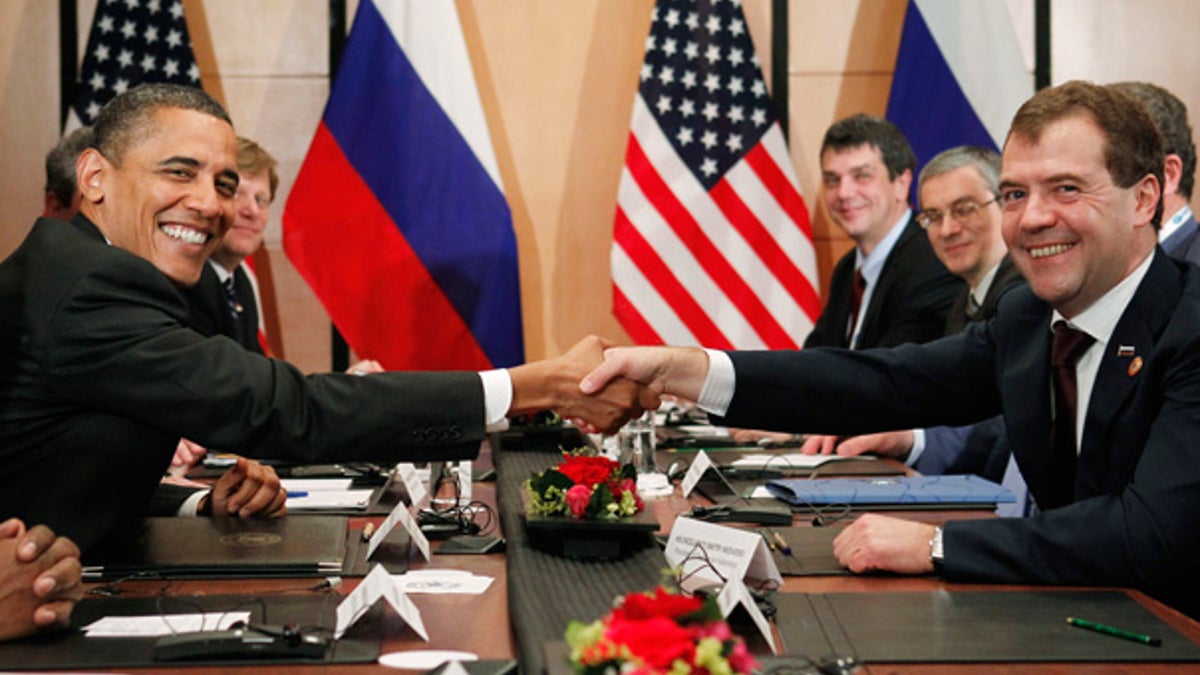
Nov. 14: President Obama shakes hands with President Dmitry Medvedev of Russia on the sidelines of the APEC summit in Yokohama, Japan. (AP)
WASHINGTON -- Americans were watching closely for signs about how much tax they will pay in coming years as the lame duck Congress convenes this week for a last session before the new Republican majority takes control of the House of Representatives.
What is more important for the larger world is Senate ratification of a new START arms pact with Russia.
The new nuclear arms reduction treaty, signed by President Barack Obama and his Russian counterpart Dmitry Medvedev in April, still has not been ratified by the Senate as required by the Constitution. The pact must receive 67 votes in the 100-seat Senate. Historically the upper chamber has overwhelmingly approved such treaties, but the rabid partisanship gripping American politics has put Senate approval in question.
The Russians have signaled that progress on Obama's policy of resetting the U.S.-Russian relationship, which deteriorated badly under former President George W. Bush, hangs on ratification of the treaty. Failure to ratify the pact, which continues cuts in nuclear armaments constructed during the Cold War arms race, could result in Russia ending help it has recently given Obama as he tries to prevent Iran from building a nuclear bomb.
"When we look upon how important Russian support has been" on Iran sanctions and the Afghanistan supply route, "my hope is that because this is a good treaty we should get it done," Obama told reporters on Air Force One as he returned home from Japan.
During meetings in Asia last week, Obama assured Medvedev of ratification.
"I reiterated my commitment to getting the START treaty done during the lame-duck session," Obama said Sunday after talks with Medvedev on the sidelines of the summit of the Asian-Pacific Economic Cooperation (APEC), Obama also restated support for bringing Russia into the World Trade Organization, calling Russia "an excellent partner."
The START treaty, which has been pending in the Senate for months, would reduce the limit on strategic warheads to 1,550 for each country from the current ceiling of 2,200. It also would set up new procedures to allow both countries to inspect each other's arsenals to verify compliance.
The treaty has drawn resistance, principally from minority Republicans. A congressional aide briefed on White House plans for getting it ratified told The Associated Press this week that the White House was adding $4.1 billion in funding for the U.S. nuclear arsenal in an effort to pick up the necessary votes.
While Obama will focus more heavily on foreign relations in the face of Republican gains in Congress -- he travels abroad again Thursday to attend the NATO summit in Portugal -- he will remain challenged nearly hourly on the U.S. economy and its weak recovery from the recession that rattled Americans in the final months of the Bush presidency.
Clearly the most divisive issue separating Democrats and Republicans is tax policy, which dominated U.S. politics throughout the congressional election campaign. Pounding a message that promised smaller government and low taxes, Republicans and their tea party allies delivered a crushing blow to Obama and his Democrats.
At issue are tax cuts passed under Bush in 2001 and 2003 but set to expire on Dec. 31. Obama wants Congress to make permanent the breaks for Americans who make less than $200,000 for individuals or $250,000 for couples, while letting expire cuts for people who earn more than those amounts. Republicans want to keep the reduced tax rates in place for all Americans.
Obama contends the wealthy can well afford to pay higher taxes, and his administration claims extending those reductions would cost $700 billions that would need to be borrowed and add to the spiraling American debt.
Obama on Sunday reiterated his opposition to a permanent extension of current tax rates for high-income individuals.
"It won't significantly boost the economy, and it's hugely expensive," he told reporters aboard Air Force One as he returned to Washington from an Asia trip. "So we can't afford it."
He acknowledged, though, that Republicans have "some strong feelings" about making the tax cuts for the wealthy permanent. "If they feel very strongly about it, then I want to get a sense of ... how they intend to pay for it," Obama said.
Senate Minority Leader Mitch McConnell has introduced legislation that would permanently extend the current tax rates for all income levels, but on Sunday signaled an openness to negotiate.
"I'm willing to listen to what the president has in mind for protecting Americans from tax increases," McConnell, a Kentucky Republican, said in a statement.
Two prominent Republicans conceded on Sunday that the best Congress might be able to accomplish in the coming weeks was a short term-continuation of the current tax rates.
"If the president wants to compromise on a two- or three-year extension ... if that's all we can get out of the president, and he is the president, so we'll work with him on that," said Sen. Jim DeMint, a South Carolina Republican and a leader of his party's conservative wing.
Likewise, Sen. John McCain of Arizona, the Republican presidential contender in 2008, said he could fathom a short-term extension of all the tax cuts. McCain voted against the Bush tax cuts, saying they disproportionately benefited wealthy Americans and did not rein spending.
"They should be extended until we are out of this recession," McCain said. "At such time we can look at other tax hikes. But when we're in a serious recession I cannot believe that raising taxes is a good thing on anybody."
The recession officially ended in June 2009, but the recovery has been markedly slow, with unemployment stuck at 9.6 percent.




